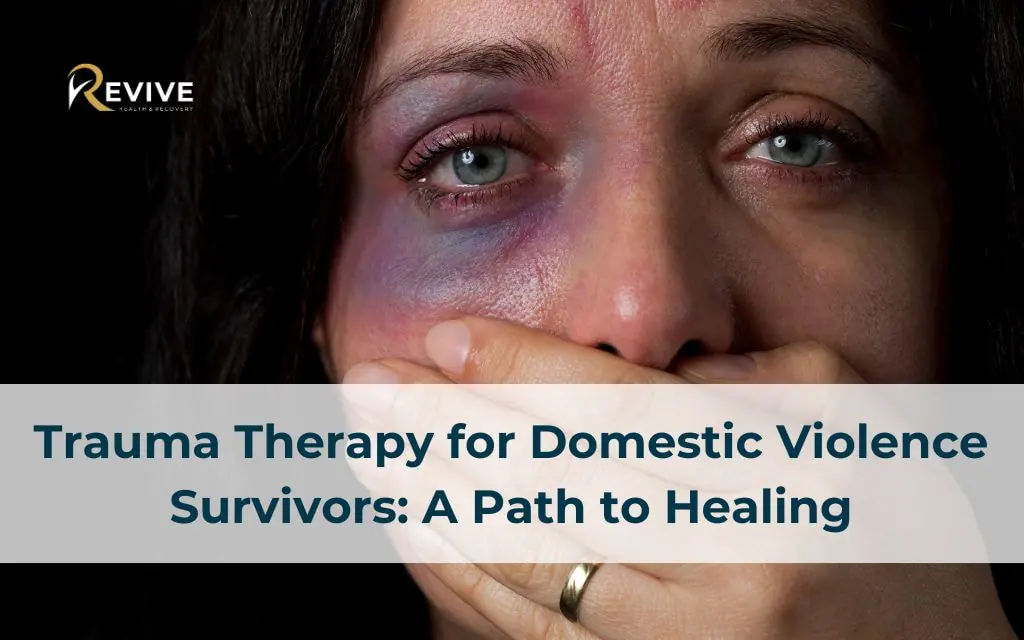In Trauma Recovery Insights, Domestic violence affects thousands of Coloradans each year, with recent data showing over 17,000 reported incidents in Denver alone. Behind these statistics are real people carrying invisible wounds that persist long after leaving dangerous situations. Trauma leaves lasting imprints on survivors’ minds and bodies, but effective therapy offers genuine hope for recovery.
At Revive Health Recovery in Denver, we understand the complex journey survivors face. Our team provides specialized trauma therapy for domestic violence survivors within a framework that prioritizes safety, empowerment, and long-term healing.
What is Trauma Therapy?
Trauma therapy represents a specialized approach designed to address the emotional and psychological effects of traumatic experiences. Unlike general counseling, trauma therapy directly confronts how violence reshapes a person’s sense of safety, trust, and self-worth.
For domestic violence survivors, trauma therapy provides essential tools to process painful experiences, reduce distressing symptoms, and rebuild internal strength. The National Domestic Violence Hotline recognizes trauma therapy as a cornerstone intervention for survivors seeking to reclaim their lives.
How Trauma Therapy Helps Survivors Heal
Processing Traumatic Experiences
Trauma therapy creates a protected environment where survivors can gradually confront and reframe past experiences. Through skilled guidance, therapists help survivors integrate fragmented memories and make sense of what happened without becoming overwhelmed.

“Trauma therapy gave me a place to talk about things I couldn’t share with anyone else,” reports one Denver survivor. “My therapist helped me understand what happened wasn’t my fault and that I could move forward.”
Reducing Symptoms of PTSD
Many domestic violence survivors experience post-traumatic stress symptoms including flashbacks, nightmares, anxiety, and hypervigilance. These reactions stem from the brain’s protective mechanisms but cause significant distress.
Evidence-based trauma therapy reduces these symptoms by addressing their neurobiological roots. Research shows that survivors who complete trauma therapy report substantial decreases in PTSD symptoms and improved functioning in daily life.
Building Resilience and Empowerment
Beyond symptom reduction, trauma therapy fosters lasting resilience. Survivors develop stronger self-awareness, emotional regulation skills, and strategies for maintaining personal boundaries. This foundation supports empowerment—restoring survivors’ sense of control over their lives and futures.
Empowerment-based interventions specifically focus on helping survivors recognize their strengths and make choices aligned with their values. This approach proves particularly effective for people rebuilding lives after experiencing control and coercion from intimate partner violence.
Types of Trauma Therapy for Domestic Violence Survivors
EMDR Therapy
Eye Movement Desensitization and Reprocessing (EMDR) therapy represents a powerful approach for processing traumatic memories. During EMDR sessions, therapists guide survivors through bilateral stimulation (typically eye movements) while focusing on traumatic memories, helping the brain process these experiences differently.
The American Psychological Association and World Health Organization recognize EMDR as effective for trauma treatment. Many survivors find EMDR particularly helpful because it doesn’t require extensive discussion of traumatic details.
Cognitive Behavioral Therapy (CBT)
Cognitive Behavioral Therapy addresses how trauma distorts thoughts and beliefs about oneself, others, and the world. CBT helps survivors identify and challenge unhelpful thinking patterns while developing healthier perspectives.

For example, survivors often develop beliefs like “I’m unsafe” or “I deserve mistreatment.” CBT provides structured techniques to examine these beliefs and develop more accurate, empowering alternatives. Research consistently demonstrates CBT’s effectiveness for trauma recovery.
Feminist Therapy Approaches
Feminist therapy approaches to trauma recognize how social and cultural factors contribute to domestic violence, aligning with culturally sensitive trauma treatment. These approaches examine power dynamics, gender socialization, and systemic issues while supporting survivors’ healing.
Rather than focusing solely on individual symptoms, feminist therapy contextualizes survivors’ experiences within broader social patterns. This framework helps survivors understand their experiences weren’t isolated incidents but part of larger social problems—reducing shame and isolation.
Other Therapies
Several other therapeutic approaches show promise for domestic violence survivors:
- Prolonged Exposure therapy helps survivors gradually confront trauma-related fears
- Group therapy connects survivors with others who understand their experiences
- Somatic therapies address trauma’s physical manifestations in the body, alongside complementary approaches like art therapy for trauma survivors.
- Narrative therapy helps survivors reclaim their personal stories and identities
Dr. Lenore Walker, who developed the cycle of violence theory, emphasizes that different survivors benefit from different therapeutic approaches. The best treatment plans often combine multiple modalities tailored to individual needs.
Finding Trauma Therapy in Denver
Local Resources and Organizations
Denver offers numerous resources for domestic violence survivors seeking trauma therapy:
- Violence Free Colorado maintains a comprehensive database of services statewide
- SafeHouse Denver provides counseling and referrals for survivors
- The Denver Mental Health Collective specializes in trauma-informed care
- Revive Health Recovery offers specialized trauma therapy programs for survivors
When searching for trauma therapy for domestic violence survivors in Denver, start with these established organizations for guidance to appropriate services.
If you are a woman, check out our article on Women’s Trauma Treatment Centers in Denver.
State-Funded Programs
Colorado provides several funding channels for survivors seeking therapy:
- The Colorado Domestic Abuse Fund supports free counseling services
- Victims Compensation programs can cover therapy costs for eligible survivors
- The Domestic Violence Resource Network connects survivors with affordable options
- Community mental health centers offer sliding-scale fees based on income
These programs exist specifically to ensure cost barriers don’t prevent survivors from accessing healing resources. They represent vital pathways to care for survivors with limited financial means.
How to Choose a Therapist
Finding the right trauma therapist requires consideration of several factors:
- Specialized training: Look for therapists with specific training in trauma treatment and domestic violence dynamics
- Therapeutic approach: Consider which treatment methods align with your preferences and needs
- Personal comfort: Trust your instincts about whether a therapist feels safe and supportive
- Practical factors: Consider location, cost, insurance acceptance, and session availability
To find a trauma therapist for domestic violence survivors in Denver, utilize therapist directories, ask trusted organizations for referrals, or contact Revive Health Recovery for guidance tailored to your situation.
Getting Started with Trauma Therapy
Steps to Begin Therapy
- Research potential providers: Identify therapists or programs specializing in trauma and domestic violence
- Contact providers: Call or email to inquire about services, specialties, and availability
- Verify practical details: Check insurance coverage, costs, location, and session formats
- Schedule an initial consultation: Most therapists offer an introductory session to determine fit
- Prepare questions: Consider what you want to know about the therapist’s approach
Remember that starting therapy represents an act of courage and self-care. Organizations like Revive Health Recovery provide supportive intake processes designed with survivors’ needs in mind.
What to Expect in Your First Session
Your first trauma therapy session typically focuses on establishing safety and rapport. The therapist will:
- Welcome you and explain confidentiality parameters
- Gather information about your current situation and needs
- Listen without judgment to whatever you feel comfortable sharing
- Discuss potential approaches to address your concerns
- Answer questions about the therapeutic process
- Begin creating a treatment plan tailored to your goals
Most importantly, you maintain control over what and how much you share. Effective trauma therapists understand the importance of moving at a pace that feels manageable for you.
FAQs about Trauma Therapy for Domestic Violence Survivors
What is trauma therapy and how does it help domestic violence survivors?
Trauma therapy represents a specialized approach to healing the psychological, emotional, and physical effects of traumatic experiences. For domestic violence survivors, it helps process painful memories, reduce PTSD symptoms, restore a sense of safety, and build skills for healthy relationships. Research shows trauma therapy significantly reduces depression, anxiety, and post-traumatic stress while improving quality of life.
How much does trauma therapy cost in Denver?
The cost of trauma therapy for domestic violence survivors in Denver varies widely. Private therapy typically ranges from $80-$150 per session, though many therapists offer sliding scale fees based on income. Insurance often covers trauma therapy, particularly with in-network providers. Additionally, numerous grant-funded programs provide free or low-cost therapy specifically for domestic violence survivors.
How do I find a qualified trauma therapist in Denver?
To find a trauma therapist for domestic violence survivors, utilize resources like:
– Psychology Today’s therapist directory (filter for trauma specialists)
– Referrals from domestic violence organizations
– Your insurance provider’s network directory
– Denver-based trauma treatment centers like Revive Health Recovery
Look for therapists with credentials in trauma-specific therapies (EMDR, CPT, etc.) and experience working with domestic violence survivors.
What can I expect when starting trauma therapy?
When starting trauma therapy, expect a supportive intake process where you’ll discuss your needs and goals. The therapist will explain their approach, establish safety protocols, and begin building trust. Early sessions focus on stabilization and coping skills before addressing traumatic memories directly. The pace remains under your control throughout the process.
Are there free or low-cost therapy options for domestic violence survivors in Colorado?
Yes, Colorado offers several free and low-cost therapy options for survivors:
– The Colorado Domestic Violence Program funds free counseling services
– Community mental health centers provide sliding-scale options
– Some private therapists reserve slots for pro-bono clients
– Victim compensation programs can cover therapy costs
– Support groups offered through organizations like SafeHouse Denver
Contact the National Domestic Violence Hotline for guidance to local resources matching your needs.
Revive Health Recovery – Trusted Home For Domestic Violence Survivors
About Revive Health Recovery
Revive Health Recovery stands as a leading Denver-based provider specializing in trauma-informed care for survivors. Our team combines clinical expertise with deep understanding of domestic violence dynamics to offer truly effective treatment.
Our philosophy centers on creating a safe environment where survivors can heal at their own pace. We recognize each person’s journey as unique and tailor our approaches accordingly.
Services Offered
Revive Health Recovery provides comprehensive services for domestic violence survivors:
- Individual trauma therapy using evidence-based approaches
- Group support connecting survivors with shared experiences
- Crisis intervention and safety planning
- Specialized therapy for complex trauma
- Coordination with legal and housing resources
- Family therapy when appropriate and safe

Our trauma-focused programs incorporate both immediate stabilization and long-term healing strategies. We maintain connections with the broader network of domestic violence resources to ensure comprehensive support.
Why Choose Revive Health Recovery
Survivors choose Revive Health Recovery for several key reasons:
- Our therapists possess specialized training in trauma treatment and domestic violence dynamics
- We create individualized treatment plans that respect each survivor’s unique situation
- Our approach balances processing trauma with building practical skills for daily life
- We understand the complex interplay between trauma, mental health, and substance use issues
- We foster a culture of respect where survivors make meaningful choices about their treatment
Reviews of trauma therapy for domestic violence survivors consistently highlight our compassionate care, expertise, and effectiveness. We remain committed to honoring survivors’ courage by providing treatment worthy of their trust.
For more information or to begin your healing journey, contact Revive Health Recovery today. You deserve support from people who understand.
Conclusion
The journey to healing after domestic violence takes courage, support, and expert guidance. At Revive Health Recovery, we walk alongside survivors every step of the way. Our Denver-based trauma specialists have helped hundreds of survivors transform pain into strength and reclaim their lives.
Don’t wait to begin your healing journey. Contact Revive Health Recovery today at (303) 268-4655 to speak with our compassionate intake team. We offer confidential consultations to understand your unique situation and create a personalized path forward.
Your strength brought you this far. Let us help you with what comes next.
For more information or to begin your healing journey, contact Revive Health Recovery today. You deserve support from people who understand.



